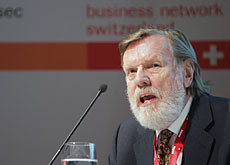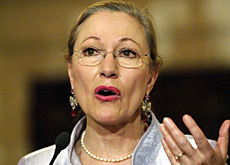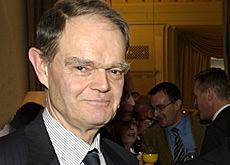Swiss urged to stay out of “declining” EU

Switzerland should continue to resist joining the European Union and stick to its guns in the ongoing tax dispute, US economics guru John Naisbitt tells swissinfo.
The best-selling author believes that Europe does not understand the concept of competition and praised Switzerland for “joining the world” instead of becoming an EU member state.
The current dispute over the cantonal corporate tax system, which has attracted company headquarters from other European countries, has soured Swiss-EU relations over the past 18 months.
Naisbitt, whose books Megatrends, Global Paradox and Mind Set have sold in their millions, lives in Vienna but he was in Zurich last week to address a conference organised by Osec, a government organisation that promotes Swiss business interests around the world.
swissinfo: What is your opinion of the EU as it celebrates its 50th birthday this year?
John Naisbitt: The first 40 years were an extraordinary miracle. The impetus in 1957 was peace. The European countries had been killing each other for 700 years and then they said ‘let’s solve our problems by discussion and negotiation’. Who would have thought it would have got this far?
But for the last six or seven years it’s moved from openness to harmonisation of rules and regulations made in Brussels. The big problem for economic sustainability is that they have been giving lip service to economic reforms without anything being done about it.
The beginning of the downfall was the Lisbon Agenda in 2000 where the heads of state said the EU was going to become the most dynamic knowledge-based economy in the world. But every year since then they have lost ground to the US, which is ridiculous.
swissinfo: What’s so bad about harmonisation?
J.N: It is very detrimental to further development. When Bulgaria and Romania joined in January they got 100,000 pages of rules and regulations and that’s at odds with creativity and diversity.
Until that changes the EU will continue on the path to mutually assured decline. That means the member states are all going down in solidarity together, holding onto the social model [the policy of providing protection for workers and national industries].
swissinfo: What do you make of the Swiss-EU dispute over corporate taxes?
J.N: I love the canton of Zug for lowering taxes to get people to go there. The EU does not understand competition, but that’s what you need. I don’t understand why Europe is so hostile to entrepreneurs because you can’t revitalise the economy or create a new one without bottom-up entrepreneurialism.
swissinfo: There is a danger that Switzerland could be isolated by its stance.
J.N: What would isolation look like? So what if Switzerland gets frozen out of the bilateral process? The EU is less and less dynamic every year so why would they look to be part of it?
swissinfo: Is Switzerland better off outside the EU in this case?
J.N: Switzerland is a past master at playing countries off against each other for Switzerland’s benefit. Even now they have this step-by-step thing [bilateral agreements] where they can buy into EU programmes without joining.
I was in Austria when they voted to join the EU, but I thought, why would you want to do this? Why don’t you do it like Switzerland and join the world?
swissinfo-interview: Matthew Allen in Zurich
John Naisbitt has been credited with correctly predicting many economic and social trends since the publication of his first book, Megatrends, in 1982 that has sold more than nine million copies.
The one-time assistant secretary of education to president John F Kennedy and special assistant to President Lyndon Johnson continues to write books and lecture around the world. A former executive at both IBM and Eastman Kodak, he is a faculty member of Nanjing University in China.
Switzerland signed the Free Trade Agreement with the EU in 1972. The EU now says Switzerland is violating this agreement with its cantonal corporate taxation system.
Switzerland lodged a request to join the EU in 1992 that remains frozen to this day. In the same year Swiss voters rejected joining the European Economic Area (EEA).
Switzerland then pursued a system of bilateral agreements with the EU to participate in certain EU programmes. The first set was passed by the Swiss voters in 2000 and came into force in 2002. The second set passed a referendum in 2005.

In compliance with the JTI standards
More: SWI swissinfo.ch certified by the Journalism Trust Initiative



You can find an overview of ongoing debates with our journalists here. Please join us!
If you want to start a conversation about a topic raised in this article or want to report factual errors, email us at english@swissinfo.ch.